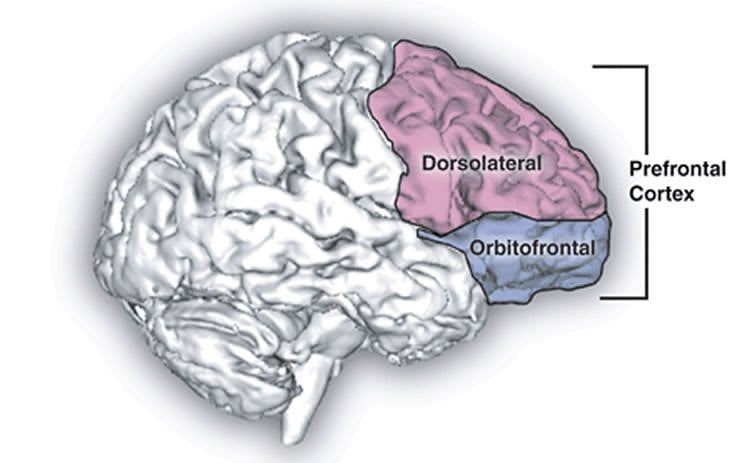Summary: Researchers shed light on areas of the brain associated with metacognitive judgements.
Source: Juntendo University.
Metacognitive judgments on non-experienced events are processed in the frontopolar cortex of the brain, whereas metacognition on experienced events is associated with the dorsal prefrontal cortex, as reported in a study on non-human primates just published in Neuron.
To establish that a non-experienced event was indeed not experienced before requires a more comprehensive and introspective memory search. Thus, involvement of highly intellectual cognitive processes is expected, of which neuronal substrate should be different from that of being confident about experienced events.
To shed light on the area of the brain involved in the evaluation of experienced and non-experienced events, Yasushi Miyashita and colleagues at Juntendo University Graduate School of Medicine and the University of Tokyo School of Medicine combined whole-brain search of the neuronal substrate by functional magnetic resonance imaging (fMRI) with causal behavioral tests by reversible silencing of the localized brain areas.
Monkeys were presented with a metacognition task composed of a memory and a bet stage. After being exposed to a set of images, the monkeys had to indicate whether or not an image was part of the set, and successively make a confidence judgment about their decision by wagering. The researchers then calculated a correlation coefficient between the metacognitive performance and the fMRI activity recorded in each voxel, finding that only the fMRI activity in the bilateral frontopolar cortex (dorsal area 10) predicts metacognitive performance for non-experienced events, whereas the activity in the dorsal prefrontal cortex (area 9) is predictive of metacognitive performance for experienced events. Area 10 and area 9 show a strong intrinsic functional connectivity, thus they seem to work cooperatively to enable metacognitive judgments.
In order to establish a direct causal link between the neuronal activity in area 10 and metacognitive performance, Miyashita and colleagues injected the area with muscimol that suppresses neuronal activities specifically within a few millimeter from the injected point. As a control, a saline solution was also injected. The result of the muscimol injection was an impairment in confidence judgment for non-experienced events, but not for experienced events. Notably, the ability to identify novel events by distinguishing from experienced events was not affected by inactivation of area 10.

The authors believe that the observations provide a general framework to explain the function of the frontopolar cortex, an evolutionary novel brain area developed only in humans and monkeys. “Area 10 possibly contributes to abstraction of novel concepts with respect to one’s own goal, or metacognitive reasoning to deal with unfamiliar situations. Our findings demonstrating the causal impairment of metacognition for non-experienced items by inactivation of area 10 provide direct evidence with this idea” comment Miyashita and colleagues.
Source: Juntendo University
Publisher: Organized by NeuroscienceNews.com.
Image Source: NeuroscienceNews.com image is in the public domain.
Original Research: Abstract in Neuron.
doi:10.1016/j.neuron.2017.12.040
[cbtabs][cbtab title=”MLA”]Juntendo University “Cognitive Neuroscience and the Awareness of Ignorance.” NeuroscienceNews. NeuroscienceNews, 27 January 2018.
<https://neurosciencenews.com/ignorance-awareness-8383/>.[/cbtab][cbtab title=”APA”]Juntendo University (2018, January 27). Cognitive Neuroscience and the Awareness of Ignorance. NeuroscienceNews. Retrieved January 27, 2018 from https://neurosciencenews.com/ignorance-awareness-8383/[/cbtab][cbtab title=”Chicago”]Juntendo University “Cognitive Neuroscience and the Awareness of Ignorance.” https://neurosciencenews.com/ignorance-awareness-8383/ (accessed January 27, 2018).[/cbtab][/cbtabs]
Abstract
Reversible Silencing of the Frontopolar Cortex Selectively Impairs Metacognitive Judgment on Non-experience in Primates
Highlights
•Frontopolar area 10 is active for metacognitive judgment of non-experienced events
•Inactivation of area 10 selectively impairs metacognition of non-experienced events
•Ability to detect non-experienced events is unaffected by inactivation of area 10
•Causal origin for awareness of ignorance is distinctive from that of experience
Summary
Self-evaluation of one’s own ignorance requires us to peer into our own mind retrospectively. Here, we found that only the bilateral frontopolar cortices (area 10) are recruited for metacognitive evaluation of non-experienced events in macaque monkeys performing metacognitive confidence judgment on memory under fMRI scanning and that targeted reversible inactivation of the localized spots in area 10 selectively impaired the confidence judgment of non-experienced events. In contrast, fMRI experiments revealed that area 10 was not recruited for metacognition of experienced events like the way that the dorsal prefrontal cortex (area 9) was and, correspondingly, the inactivation of area 10 did not impair confidence judgment of experienced events. Notably, this inactivation did not impair the ability to identify novel events by distinguishing from repetitive events. Our findings elucidate that the frontopolar cortex plays a causal role to confer not awareness of past experience in general but awareness of one’s own ignorance.






